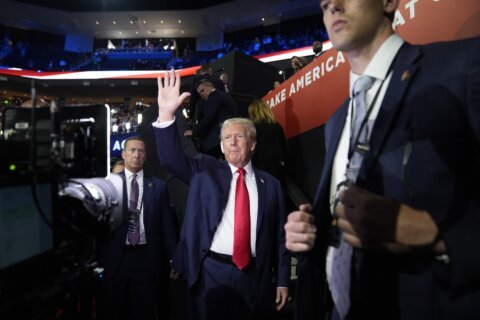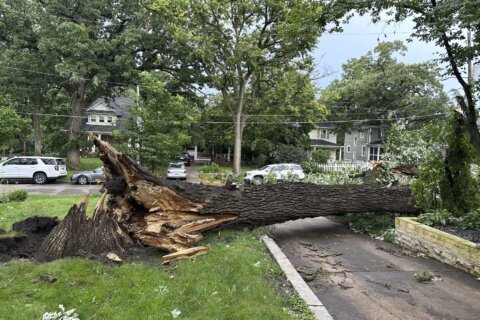SCHURZ, Nevada (AP) — Members of the Walker River Paiute Tribe have watched the boundaries of their land recede over time along with the waters of the lake that are central to their identity, threatening the cultural symbol that gave the tribe its name — Agai Dicutta, or Trout Eaters.
Not wanting to cede their voice, tribal leaders have been making a push for expanded voting rights. That effort includes filing a lawsuit on behalf of all Nevada tribes seeking polling places on tribal lands and access to early voting.
“Tribes shouldn’t have to keep filing lawsuits just to vote on their own lands,” said Elveda Martinez, 65, a tribal member and longtime voting advocate. “It should be more accessible.”
The state has now granted the Walker River Paiutes and other tribes in Nevada a new right that advocates hope will greatly expand voting access for a community that gained U.S. citizenship only a century ago.
Voting on reservations across the country has historically been difficult, with tribal voters sometimes having to travel dozens of miles to their polling place. Slow mail service and lack of a physical address, common on tribal lands, have proved challenging.
The new process — the ability to cast ballots electronically — has the potential to significantly boost turnout among all tribes in Nevada. But what some see as a small measure of justice to equalize voting rights raises security concerns for others, with implications far beyond Nevada’s 28 tribal communities as the nation braces for what is expected to be another close and contentious presidential election in November.
Under the plan, tribal members in Nevada who live on a reservation or colony can receive a ballot electronically through an online system set up by the state and then return it electronically. While not speaking specifically about Nevada’s system, experts warn that such voting — when a completed ballot is sent back either by email, through an online portal or by fax — carries risks of ballots being intercepted or manipulated and should be used sparingly, if at all.
“At this point in the United States, it’s a relatively small number of ballots that are coming through that way,” said Larry Norden, an election expert with the Brennan Center for Justice. “But we should be very concerned — both from actual security risks but also from a public confidence point of view — about expanding this.”
‘HIGH-RISK ACTIVITY’
While electronic voting may be limited at the moment, it’s available across much of the country to specific groups of voters. More than 30 states allow certain voters to return their ballots either by fax, email or an online portal, according to data collected by the National Conference of State Legislatures and Verified Voting, a nonpartisan group that studies state voting systems.
In most cases, electronic ballot return is available only to U.S. military and overseas voters. But it’s been expanded in recent years to include voters with disabilities in a dozen states. Nevada is believed to be the first to add tribes.
Cal Boone, the new tribal outreach coordinator for the Nevada Secretary of State’s Office and a member of the Walker River Paiute Tribe, has begun meeting with tribes around the state to share details about the process, which he believes could ease a legacy of barriers that has left some reluctant to vote.
“In past years, tribes didn’t have access to vote in multiple ways. You had to rely on the mail system to cast your vote or otherwise drive out to great lengths to vote,” Boone said. “What we are seeing in Nevada is really powerful, and it really sets the stage for what other states throughout the country can be doing to help support tribes.”
But the solution comes with risks.
In a 2020 memo to election officials, the FBI and other federal agencies assessed the risk of sending ballots electronically to be low, but allowing those ballots to be returned electronically was high. The memo highlights recommended security practices for systems that use internet or network connections.
“The information provided should be considered a starting point,” the memo states. “Even with these technical security considerations, electronic ballot return remains a high-risk activity.”
Earlier this year, the U.S. Cybersecurity and Infrastructure Security Agency, which is charged with helping protect the nation’s election systems, said in an online post that the memo was being redistributed to ensure state officials and policymakers are “fully informed of risks” associated with electronic ballot return.
Susannah Goodman, director of election security for Common Cause, is among those concerned that there are no federal guidelines for such systems and no independent reviews, unlike what’s in place for voting machines and ballot tabulators.
An attempt to create independent standards ended in late 2022 after a group of experts determined it wasn’t possible at the time given the technology and cyber risks.
‘CONFIDENT IN OUR SYSTEM’
Kim Wyman, the former top election official in Washington state, initially supported electronic voting as a military spouse, but said she grew wary after taking over as secretary of state. Her attempt to persuade lawmakers to repeal it was unsuccessful.
Wyman said she worries something could happen to the ballot in transit and what that would mean for public confidence in elections. She believes the safest bet is for voters who receive ballots electronically to print them out and return them by mail.
“Election officials are in a hard spot because they want to provide accessibility and they want to make sure that every eligible American has a right to participate in an election,” Wyman said. “But they have to do it in a way where they’re also securing those ballots and making sure that that voter’s ballot is counted the way the voter cast it.”
Nevada Secretary of State Cisco Aguilar said he knows the process carries risks, but sees everything related to elections as having some risk. He pointed to the federal government’s action in 2017 to designate the nation’s voting systems as critical infrastructure, just like dams, banks and nuclear power plants.
The state’s electronic ballot return system was designed by the state with security measures intended to verify eligibility, authenticate voters and their ballots, and ensure secure communications, he said. There are steps to ensure voters are not casting multiple ballots, and the system undergoes regular security reviews and updates.
“I’m confident in our system,” Aguilar said.
He expressed frustration about what he described as a lack of national leadership on this and other election issues, saying there should be less criticism and more work and funding to address concerns.
“The federal government has access to so many experts, they have access to resources. They should be providing a leadership position to give us a path forward,” Aguilar said. “To think backward and to scare us is not the appropriate way to do this.”
STATES DIVIDED OVER SECURITY CONCERNS
So far, few Nevada voters have opted in. As of Friday, 255 voters had submitted a ballot electronically — none of them tribal members — ahead of Tuesday’s primary. More than half of those were registered in Clark County, which includes Las Vegas and is the state’s most populous.
“Folks that participate find it very convenient and very easy to use,” Clark County Registrar Lorena Portillo said.
Ahead of the 2022 midterm elections, just over 2,500 voters returned their ballots electronically through the state system. Among them was Ramona Coker, who is blind. Coker said she no longer needs help to vote and can cast a ballot on her phone, which is equipped with screen-reading technology allowing her to follow audio prompts to make her selections.
“It feels very American. It feels like you have done your part and no one else has had an influence in that,” said Coker, who works for a Reno-area nonprofit.
She believes the challenges faced by voters with disabilities outweigh the potential risks of electronic balloting.
“We’re always going to have bad-faith actors out there, no matter what delivery form or what return form that we use,” Coker said. “And if you’re always worried about that, then you never cast a vote again.”
States led by both Democrats and Republicans have authorized electronic ballot returns, with varying rules. Alaska, California, Florida and Oklahoma limit the process to military and overseas voters and only permit electronic return by fax. In Texas, astronauts can use an online portal to cast their ballots. In West Virginia, first responders on duty outside their county also are eligible.
“Having been in the military, I’ve seen intelligence transmitted via the internet. We transmit nuclear codes via the internet,” West Virginia Secretary of State Mac Warner said. “If we can do that, we can certainly get a secure ballot and transmit across the internet.”
Not all states have embraced the practice. In Minnesota, officials considered it but ultimately decided against it.
“In light of recent security concerns, it’s on ice,” said Minnesota Secretary of State Steve Simon. “Someday — if those security considerations are addressed and if the concerns and objections of the federal agencies can be overcome — we would definitely consider it because as a matter of convenience, it would probably make a difference.”
DIDN’T FEEL ‘OUR VOICE EVEN MATTERED’
The Walker River Paiute reservation is along a scenic stretch of highway between Las Vegas and Reno, about two hours south of the state capital in a vast stretch of desert surrounded by distant mountain peaks.
On a late spring day, sprinklers prepare alfalfa fields that dot the reservation while wild horses graze in nearby foothills. There are no grocery stores, restaurants or hotels, and the nearest town is about 30 miles away.
Although the tribe has long had its own polling location — something other tribes in the state have not — the reservation’s remoteness has sometimes added to a sense of political isolation. Some tribal members have not always seen the point in voting.
“Because of the historical abuses our people have faced, we were very timid to even take part in voting or elections,” tribal Chair Andrea Martinez said. “For many years, we didn’t feel like our voice even mattered.”
The prospect of casting ballots electronically is a step Martinez and other tribal leaders welcome, but they’re not sure it will make a major difference, at least initially. Internet access is spotty on the reservation, as is electricity because of aging utility poles.
“Although we, through the state, can access online voting, who knows if we’ll even have electricity or internet that day?” Martinez said.
Teresa McNally, who oversees the election office in Mineral County, which includes the Walker River reservation, plans to hold a meeting with tribal members this year to explain the new system.
One thing she wants to emphasize is the focus on security, including the measures protecting the electronic ballot return system.
“What it takes to even get into our internet system here, it’s crazy,” she said.
Courtney Quintero, a tribal member and chair of the board overseeing tribal elections, said she planned to use the new system once she learned more about it, but acknowledged others may be hesitant.
“Trust is a big thing with our community,” she said.
___
The Associated Press receives support from several private foundations to enhance its explanatory coverage of elections and democracy. See more about AP’s democracy initiative here. The AP is solely responsible for all content.
Copyright © 2024 The Associated Press. All rights reserved. This material may not be published, broadcast, written or redistributed.







